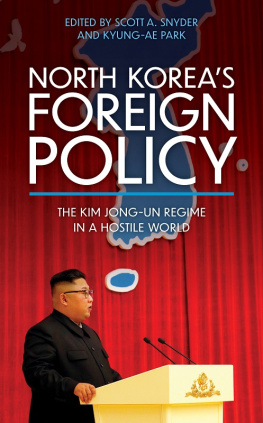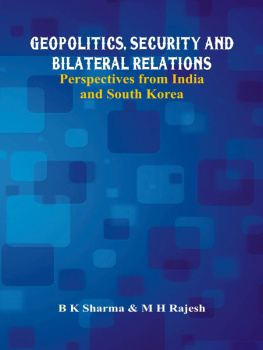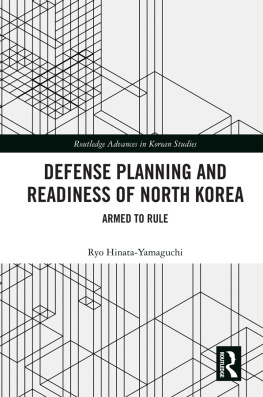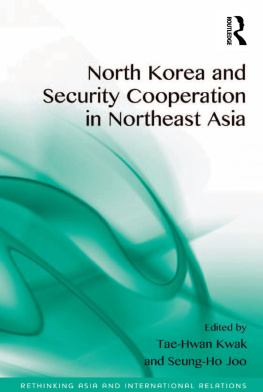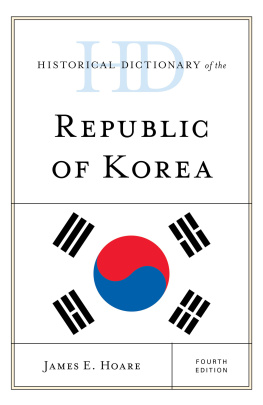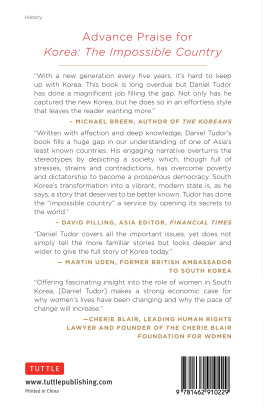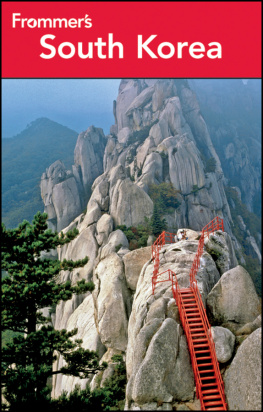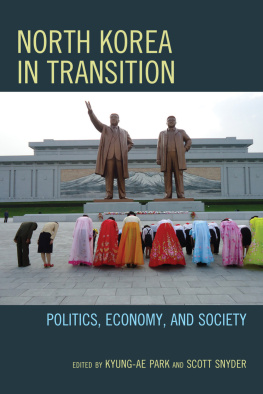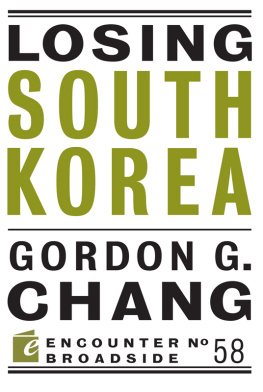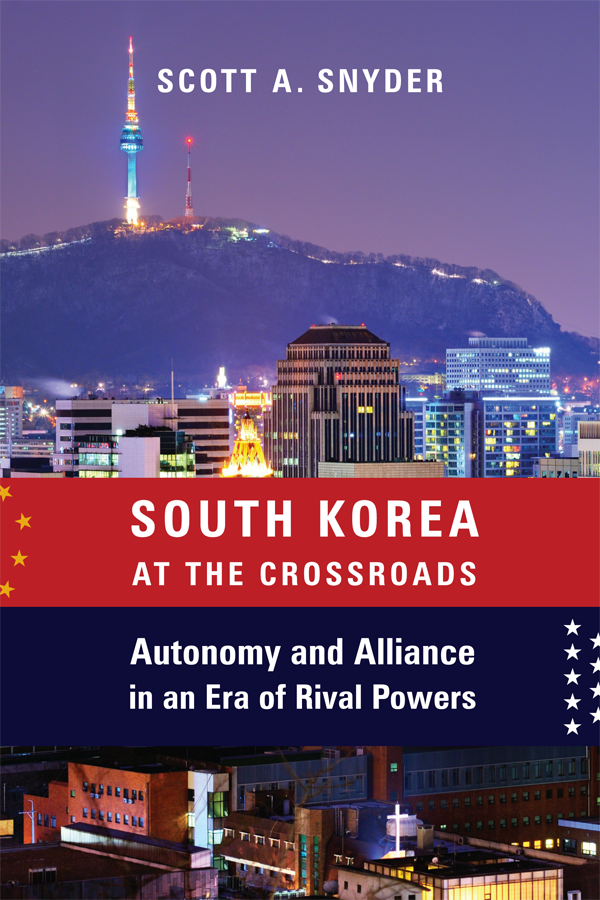Contents
Guide
Pagebreaks of the print version
SOUTH KOREA AT THE CROSSROADS
A COUNCIL ON FOREIGN RELATIONS BOOK
The Council on Foreign Relations (CFR) is an independent, nonpartisan membership organization, think tank, and publisher dedicated to being a resource for its members, government officials, business executives, journalists, educators and students, civic and religious leaders, and other interested citizens in order to help them better understand the world and the foreign-policy choices facing the United States and other countries. Founded in 1921, CFR carries out its mission by maintaining a diverse membership, with special programs to promote interest and develop expertise in the next generation of foreign-policy leaders; convening meetings at its headquarters in New York and Washington, D.C., and in other cities where senior government officials, members of Congress, global leaders, and prominent thinkers come together with CFR members to discuss and debate major international issues; supporting a studies program that fosters independent research and enables CFR scholars to produce articles, reports, and books and to hold roundtables that analyze foreign-policy issues and make concrete policy recommendations; publishing Foreign Affairs , the preeminent journal on international affairs and U.S. foreign policy; sponsoring independent task forces that produce reports with both findings and policy prescriptions on the most important foreign-policy topics; and providing up-to-date information and analysis about world events and American foreign policy on its website, www.cfr.org.
The Council on Foreign Relations takes no institutional positions on policy issues and has no affiliation with the U.S. government. All views expressed in its publications and on its website are the sole responsibility of the author or authors.
SCOTT A. SNYDER
SOUTH KOREA AT THE CROSSROADS
Autonomy and Alliance in an Era of Rival Powers
Columbia University Press/New York

Columbia University Press
Publishers Since 1893
New YorkChichester, West Sussex
cup.columbia.edu
Copyright 2018 Columbia University Press
All rights reserved
E-ISBN 978-0-231-54618-8
Library of Congress Cataloging-in-Publication Data
Names: Snyder, Scott, 1964 author.
Title: South Korea at the crossroads : autonomy and alliance in an era of rival powers / Scott A. Snyder.
Description: New York : Columbia University Press, 2017. | A Council on Foreign Relations book. | Includes bibliographical references and index.
Identifiers: LCCN 2017024120 (print) | LCCN 2017045106 (ebook) | ISBN 9780231185486 (cloth : alk. paper)
Subjects: LCSH: Korea (South)Foreign relations19601988. | Korea (South)Foreign relations1988-2002. | Korea (South)Foreign relations2002 | Korea (South)Foreign relationsKorea (North) | Korea (North)Foreign relationsKorea (South). | Korea (South)Foreign relationsUnited States. | United StatesForeign relationsKorea (South) | Korea (South)Foreign relationsChina. | ChinaForeign relationsKorea (South)
Classification: LCC JZ1747 (ebook) | LCC JZ1747 .S69 2017 (print) | DDC 327.5195dc23
LC record available at https://lccn.loc.gov/2017024120
A Columbia University Press E-book.
CUP would be pleased to hear about your reading experience with this e-book at .
Cover image: Shutterstock
In memory of Lee Sang-Seol,
Richard H. Solomon,
and Barnett Baron

CONTENTS
FIGURES
TABLES
T he story of Korea has historically been one of survival and resiliency in the face of external threats from great-power neighbors. It is a story that combines the extraordinary stubbornness necessary to hold ones ground with exhibitions of remarkable adaptability necessary to survive in the face of geopolitical reality. It is the story of life on a geopolitical fault line in which external events can put everything at risk yet strategic choices also contribute to national prospects for survival and prosperity.
Having observed the story of Korea from many different angles over the past three decades, I have accumulated many debts to a long list of teachers who have contributed to my understanding of how Koreans think and act when making strategic choices. This project benefited from the perspectives I have gained by watching the evolution of South Korean foreign policy as a manifestation of South Koreas democratization and modernization. I am thankful for the opportunity to hold countless conversations with South Korean diplomats, academics, and Korea watchers, each of which helped me to deepen my understanding of the determinants of South Koreas strategic choices.
The immediate catalyst for this research project was the opportunity to hold a workshop on South Koreas strategic choices in the summer of 2015 involving American and South Korean specialists, cosponsored by the Seoul Forum for International Affairs, co-organized with Chung Min Lee of Yonsei University, and supported financially by the Smith Richardson Foundation and the Korea Foundation. The conversations held during the workshop jumpstarted my thinking and contributed to the overall structure and content of the book. I am grateful to Al Song at the Smith Richardson Foundation and Yu Hyun-seok, Lee Shi-yong, and Seayoun Lee at the Korea Foundation for their support, encouragement, and patience throughout the project.
I was aided in research and drafting of the manuscript by two able research associates, Sungtae (Jacky) Park and Darcie Draudt, with additional research support from Andrew Park, Daniel Jung, Cris Lee, Lynn Lee, and Myeong Park. I benefited from constructive comments by two blind reviewers and the editorial support of Anne Routon and Stephen Wesley at Columbia University Press. I am thankful to Trish Dorff, James Lindsay, and Richard Haass at the Council on Foreign Relations for providing the institutional support for this project and for reading and making invaluable suggestions for improving the draft manuscript.
Finally, I thank SoRhym, Elliana, and Elyssa Snyder for their patience with my travel absences and for their encouragement and understanding.
T he Korean Peninsula has historically been a victim of the tragedy of great-power politics, given its geographic location at the vortex of great-power rivalry in Northeast Asia. Yet South Korean leaders have historically had little ability to determine their countrys fate. Having had no viable choice but to rely on the United States as an effective protector in the decades since the Korean War, South Korea faces a strategic choice that will determine its future and influence the direction of the regional order in Northeast Asia. In this context, it must reevaluate its strategies in the face of an uncertain strategic environment generated by Chinas rise and by questions regarding the durability of its own security alliance with the United States. Should the country continue to rely for its security and prosperity on that alliance or side with a rising China as a new security guarantor, or does the country have sufficient capabilities to protect itself without external help? To avoid renewed victimization as a result of intensifying regional rivalries, South Korea must use its diplomatic capabilities to make smart strategic choices and avoid entrapment in those rivalries, all the while working with great powers to deal with the growing threat from North Korea. Yet South Koreans also face the possibility of American withdrawal or underappreciation of South Koreas strategic importance to regional stability in Northeast Asia, which could lead to drastic limitations on South Koreas security options and to increased dependency on China.


